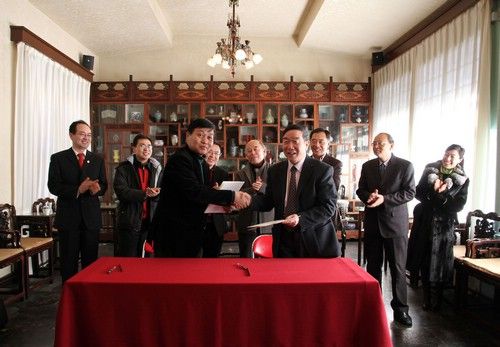Scholars discuss court history

The Graduate School of CASS signed a memo with the Palace Museum to promote theories of the Forbidden City in 2011.
On July 20 to 21, the Institute for Theories of Forbidden City at the Palace Museum and the Institute of Asian Civilization at Northeast Normal University co-hosted a symposium on the Forbidden City and political culture in Ming and Qing Dynasties in Changchun. Participants in the symposium discussed political culture and political history in classical China and expressed their opinions on the study of political culture in Ming and Qing Dynasties.
At the symposium, Zhao Yifeng, director of the Institute of Asian Civilization at Northeast Normal University, elaborated on the importance of developing research on classical Chinese political history. In the latter half of the 20th century, historians tended to criticize political history as over-valuing the position of nation-states and important figures in history, Zhao said. However, he reaffirmed the importance of political history’s role as record keeper for the important events of human history, not the least of which is the establishment and operation of public power. In all senses, research political history is not nearly as conservative as other specialized fields of history research, and it does not stall or lag behind, Zhao opined. He praised Chinese history’s emphasis on political history research as an outstanding characteristic, detailing that Chinese historians are devoting themselves to formulating new perspectives in political history and keeping abreast of the newest research in political history research.
Zhao Yi, vice-president of the Chinese Society on Ming Dynasty History and a professor at the School of History Culture and Tourism at Liaoning Normal University, observed that existing research on the Ming and Qing Dynasties has mainly focused on very specific topics rather than the broader picture. In recent years, this has resulted in part from theoretical interpretation for important issues, Zhao added. He therefore appealed to other attendees, calling for thorough discussion geared toward identifying grand narratives and consistent trends.
The concept “theories of Forbidden City” was first proposed by Zheng Xinmiao, the former curator of the Palace Museum, in 2003. The field focuses on the Forbidden City during the Ming and Qing Dynasties. The court history of these dynasties is not only a significant part of research of Forbidden City, but also an essential part of Ming and Qing political history. On this point, attendees affirmed that research and theorization on the Forbidden City has been closely connected to discussions on Ming and Qing political culture, and that it should become a point of growth for academic development.
Zheng Yifeng indicated that the development of site-based research and artifact-based research on Ming and Qing Dynasties history has yet to be realized. This is an area he thinks would be beneficial to combine with historical research on the Forbidden City to conduct comprehensive research in the future. In China, some universities and academies have already established institutions for research on the Forbidden City. Some research and recruitment has already begun at these institutions.
The Chinese version appeared in Chinese Social Sciences Today, No. 480, July 26, 2013
Translated by Zhang Mengying
Revised by Charles Horne
The Chinese link:
http://www.csstoday.net/xueshuzixun/guoneixinwen/82961.html
